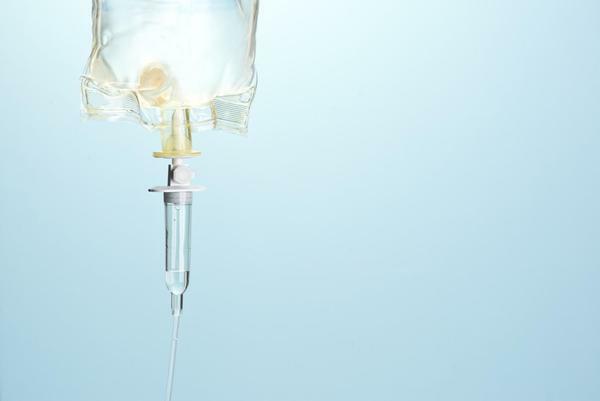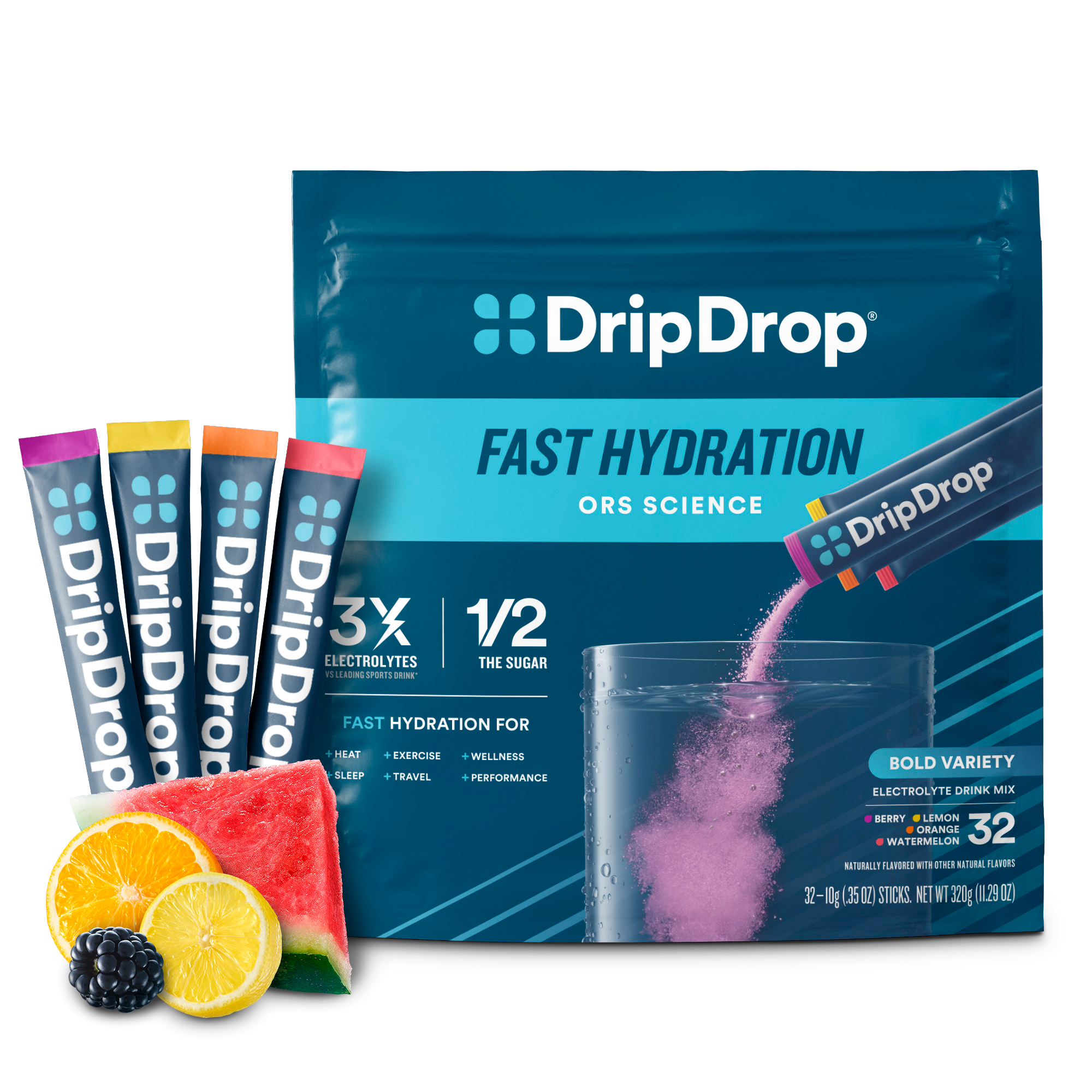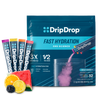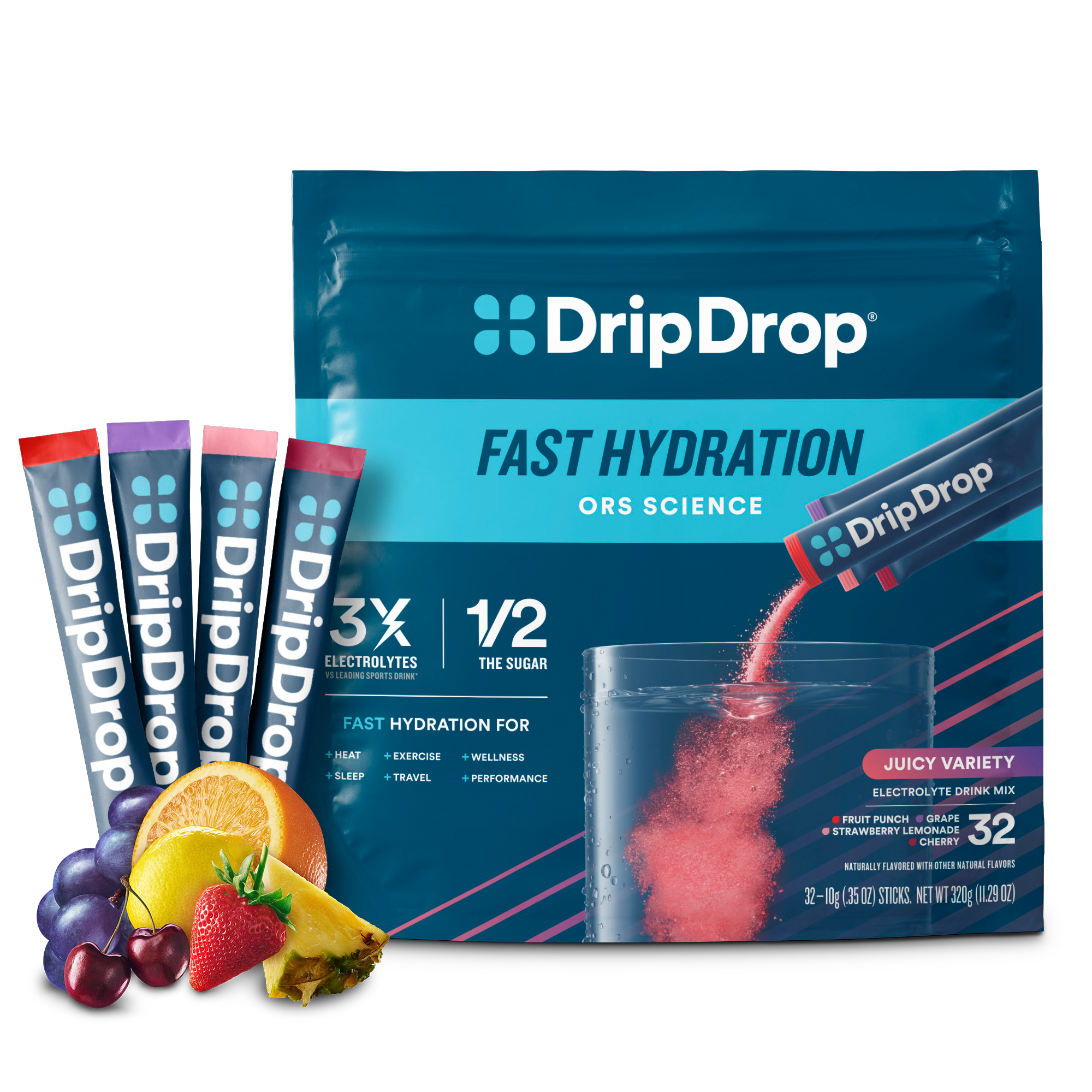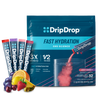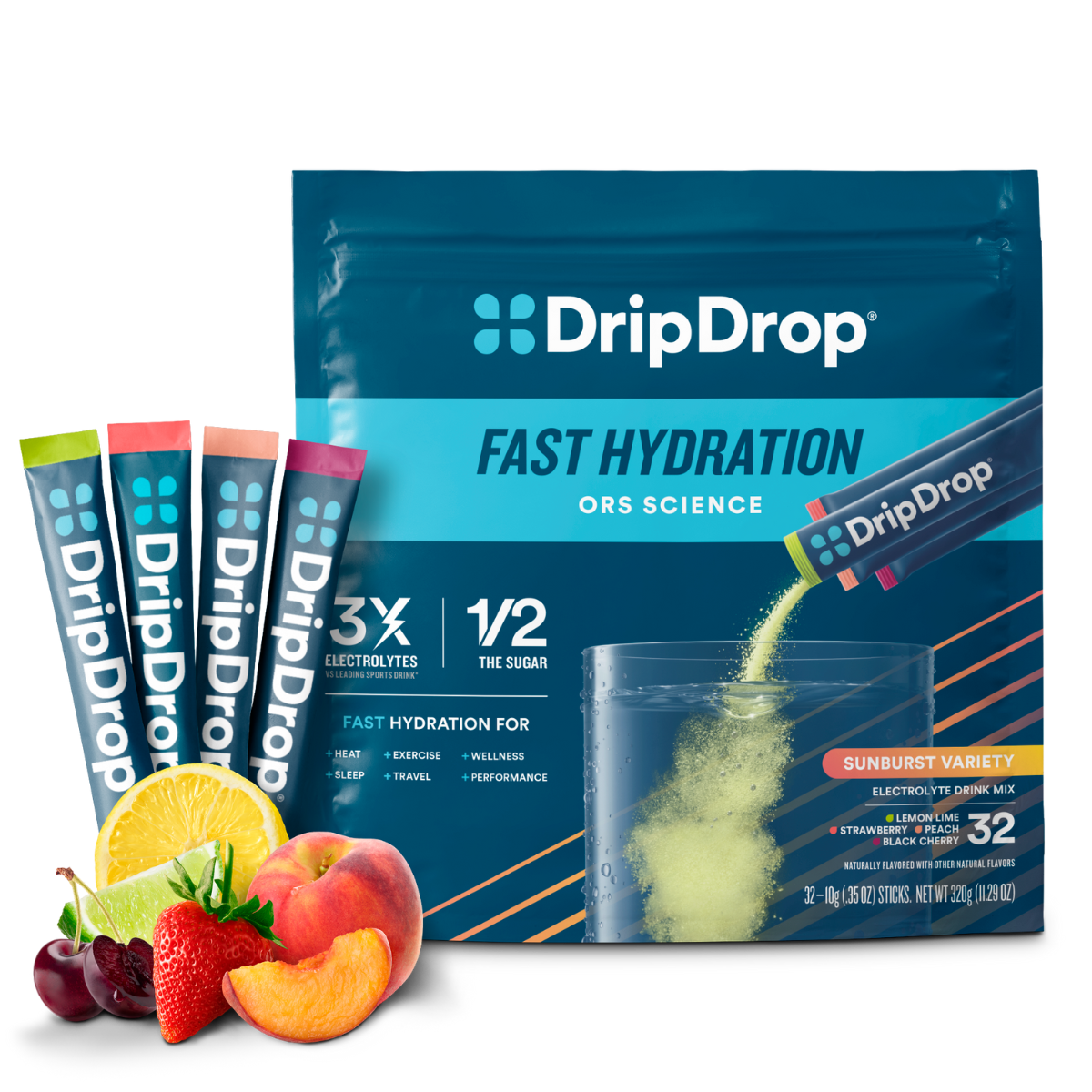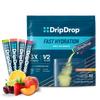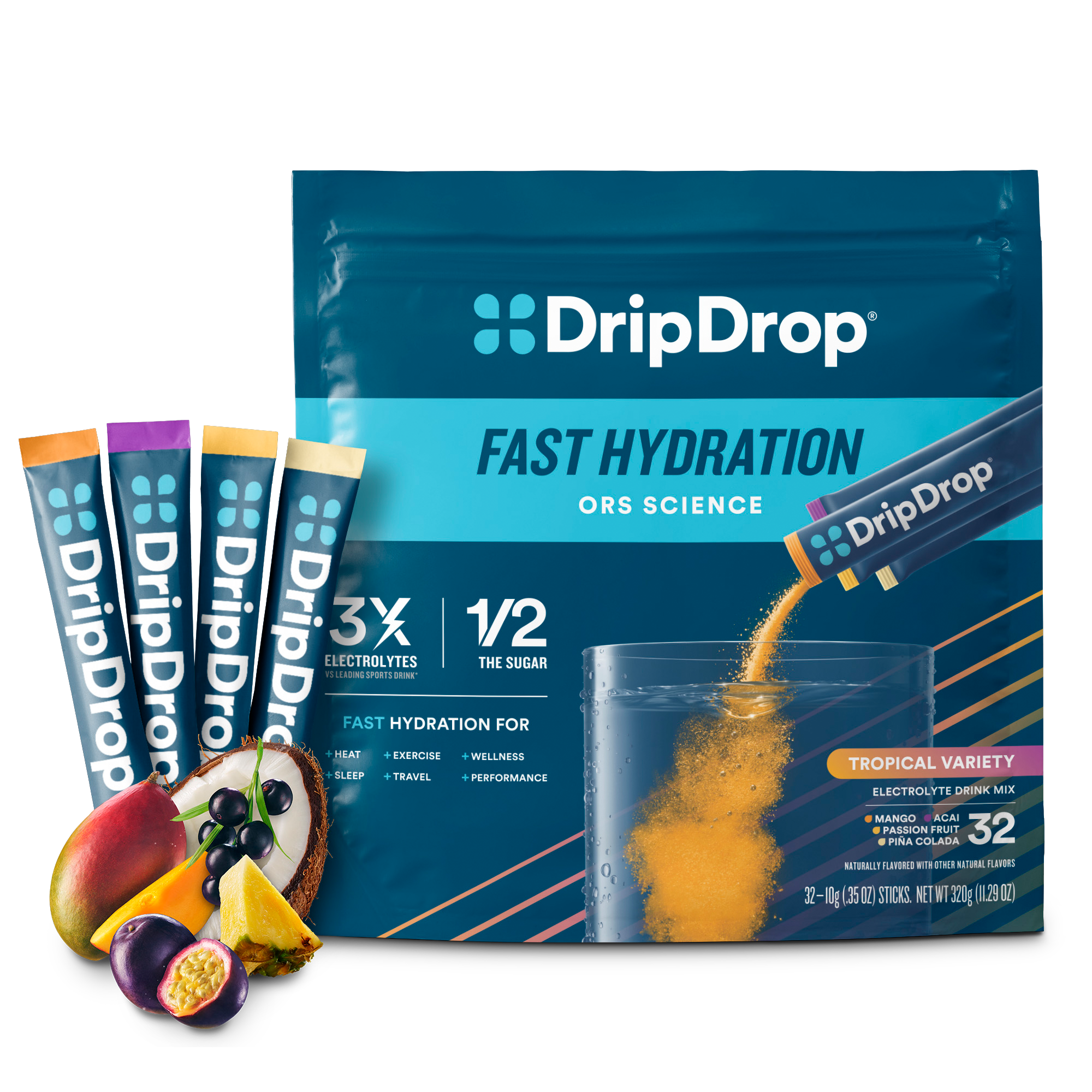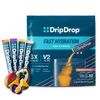When it comes to mitigating dehydration, rapid action and the right treatment solutions are of the utmost importance. For years, IV therapy has been among the most powerful treatment options. However, that doesn’t mean you have to resign yourself to a needle in your arm and hours spent in the hospital if you start to experience signs of dehydration.
Here, we’ll answer the question “What is IV therapy?” and show you the benefits and drawbacks to this treatment method. Plus, you’ll find fast and effective alternatives to painful IV therapy, including oral rehydration solutions like DripDrop, to crush mild to moderate dehydration at home.
What Is IV Therapy?
What is IV therapy? The term “IV” stands for intravenous, referring to the administration of fluids through veins inside your body. IV therapy is one of the fastest ways to get fluids into the body, especially in cases of severe dehydration. It’s also commonly used to treat malnutrition and to address electrolyte imbalances.
IV solutions can contain the following:
- Salt: Sodium is a vital electrolyte that helps your body retain water and enable muscle movement. It also helps to restore hydration by increasing your body’s ability to absorb water and other electrolytes.
- Vitamins: IV therapy is increasingly used to alleviate hangovers, jet lag, and chronic fatigue, though it is not approved as a treatment by the Food and Drug Administration (FDA). IV vitamin therapy — also known as the John Myers cocktail — may contain a range of vitamins, including B vitamins, vitamin C, calcium, amino acids, and antioxidants like glutathione, which boosts energy levels.
- Blood products: IV therapy is also used for blood transfusions.
- Medications: IV therapy can also be used to inject powerful medications for surgery and serious emergencies caused by heart problems and other health conditions.
One of the main uses of IV therapy is to treat severe cases of dehydration. Here’s how IV therapy works: A bag is filled with a saline solution that can simply contain a mixture of sodium and water or additional vitamins and minerals in addition to the sodium and water. This is particularly common, as dehydration is caused by a lack of electrolytes such as potassium or sodium. The IV solution itself is determined by the medical professionals at each hospital and is tailored to each patient’s needs and the underlying cause of the dehydration.
The fluid in the bag travels through IV line tubing — known as a catheter — to a needle at the other end. The needle is inserted into a vein in your arm or hand. This sends the solution from the IV drip directly into your bloodstream, bypassing your digestive system and gastrointestinal tract. The result is faster delivery of nutrients that your body needs to restore hydration.
How To Tell You’re Dehydrated
Now that we’ve covered the answer to “What is IV therapy?” it’s important to understand more about dehydration. With this knowledge, you can remedy dehydration before it becomes severe enough where you need to seek medical attention.
Dehydration is a condition where you lose more fluids and electrolytes than you take in. It happens commonly when you forget to drink enough fluids, when you’re sick, or when you sweat excessively. While IV hydration therapy is a common treatment for dehydration, you can avoid unwanted hospital visits by recognizing the signs of dehydration early and creating a hydration routine (more on this later).
Here are the most common signs of dehydration:
- Extreme thirst
- Headache
- Dry skin or dry mouth
- Low blood pressure
- Lightheadedness and fatigue
- Lethargy and irritability
- Dizziness
If you experience signs of severe dehydration including fainting, rapid heartbeat, or confusion, seek medical advice from an emergency room or paramedics immediately.
If you suspect you are suffering from dehydration, you don’t have to immediately head to the hospital for IV treatment. You can mitigate cases of mild to moderate dehydration at home with an oral rehydration solution like DripDrop. It’s fast and effective by offering medically relevant electrolytes to help avoid or remedy dehydration — plus it tastes great.
Benefits and Downsides of IV Therapy
Now that you know the basic answer to “What is IV therapy?” we’ll examine the pros and cons of the treatment more closely.
The main benefits of IV therapy for dehydration management are that it is fast and effective. Doctors and registered nurses can run blood tests to determine electrolyte imbalances that cause your dehydration. They can then formulate the IV fluid to address your specific dehydration. Since fluids and minerals go straight into your blood vessels, they start working immediately to reverse the effects of dehydration.
On the other hand, IV infusion therapy can be painful. The needle can cause pain at the injection site, and the needle needs to remain in your arm until a healthcare professional determines the dehydration is resolved. That means you could spend hours in the hospital receiving treatment and waiting to be discharged. During this time, the needle can also move, causing vein inflammation or bruising. In addition, there is a small risk of infection at the injection site and of kidney damage if fluids are administered too quickly.
Alternatives To Painful IV Therapy for Dehydration
You can now answer the question “What is IV therapy?” and know how to recognize warning signs. It’s time to discover alternatives that are less painful and more effective. Cases of severe dehydration may require intravenous therapy. However, for mild to moderate dehydration, you may be able to avoid unwanted hospital visits and painful IV treatment by using an oral rehydration solution to manage the condition instead.
Oral rehydration solutions like DripDrop contain a precise ratio of electrolytes, including sodium, potassium, and magnesium, to help relieve dehydration. They’re recommended by the WHO and UNICEF for the treatment of mild to moderate dehydration. Best of all, you simply sip on the solution instead of sitting in the hospital for hours and having a painful needle jabbed into your arm. In fact, studies show that the duration of dehydration was shorter when given oral rehydration therapy compared to IV therapy.
What sets DripDrop apart from other traditional oral rehydration solutions? DripDrop was developed by a doctor on a mission to defeat life-threatening dehydration. The problem with traditional oral rehydration solutions is that they were often unpalatable — especially for young children — because of saltiness.
When Doctor Eduardo Dolhun saw kids spitting out the life-saving solution, he knew something had to be done. So, he developed the patented formula of DripDrop, improving on the World Health Organization’s Oral Rehydration Solution (ORS) standards by adding a delicious taste.
The result is a medically viable ORS that also tastes great. DripDrop is a tasty alternative to invasive IV therapy for managing mild to moderate dehydration. For mild to moderate dehydration, it's powerful enough to use in extreme circumstances but safe enough for everyday use. In cases of severe dehydration, it’s important to seek medical advice from your doctor or by visiting an emergency room.
Mitigate Dehydration at-Home With DripDrop
Now that you know the answer to “What is IV therapy?” you can formulate a medical protocol for treating dehydration. Severe cases of dehydration may require medical attention and the use of IV therapy. However, mild to moderate cases of dehydration can be managed at home using an oral rehydration solution like DripDrop, helping to save you from unwanted hospital stays.
For cases of mild to moderate dehydration, DripDrop is a fast, effective, and great tasting remedy. It’s a powerful alternative to IV therapy that can be painful and require hospitalization. The convenient packaging allows you to have DripDrop when you need it, where you need it. It helps alleviate dehydration wherever you are — whether you’re at the job site or scaling a mountain in wintry, dehydration-risk conditions.
When you're in a state of dehydration, water alone is not enough. Your body needs the perfect balance of sodium and glucose to help absorption. With the precisely balanced ratio of DripDrop, you can replenish vital electrolytes and fluids to relieve dehydration quickly. Plus, DripDrop supplies vitamins like zinc, potassium, and magnesium, which are essential to support your overall health and wellness.
Medical-grade DripDrop allows you to alleviate mild to moderate dehydration without the need for costly and painful IV therapy. Our patented formula is powerful enough to help patients suffering from dehydration caused by Ebola and cholera but safe enough for everyday use. Plus, DripDrop tastes amazing and comes in a variety of flavors you can enjoy hot or cold.

